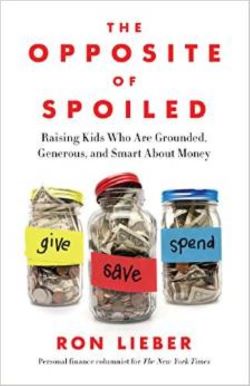I read a lot of self-help books. They are not all about money, but a good number of them are because they interest me. I like to share what I learn when appropriate.
I have two boys, ages 10 and 13. Even though I work with money and finances, a question I often get, and one I am drawn to myself, is:
“How do we teach and raise our children to be wise with money?”
I don’t want my children to take what they have for granted. I want them (and everyone) to feel comfortable and empowered with their money. I want them to make “good” choices. I believe that money and how it is used should be aligned with and a reflection of our values. Money is just a tool to help us live our best values-based life.
So, how do we teach this?
I have discussed this before.
I most recently read the book The Opposite of Spoiled: Raising Kids Who are Grounded, Generous, and Smart About Money by Ron Lieber. I thought the book was worth recommending to others, especially my husband. I wanted to discuss it together as parents.
I assume many people will not read the book, but I want to share some highlights of what I learned and thought was worthwhile here. This is the first of several articles about the book.
Lieber starts the book by trying to define what we DON’T want – spoiled children (or adults). He found spoiled children have four primary things in common, but not all of them must be present at the same time:
1. They have few chores or responsibilities around the house
2. Not many rules govern their behavior or schedules (they do whatever they want, whenever they want.)
3. They are used to parents and others showering them with time and assistance (everyone gets a trophy or helicopter parents)
4. They have a lot of material possessions.
These may all be relative (what is considered “a lot”? What is “not many” rules?) but I liked this as a starting point. (I feel like my husband and I could do better with all of these ideas, but the one that stood out for me as to where we need the most change is #1, having our boys help more around the house.)
Lieber then used a word cloud of values, virtues, and character traits to define the opposite of spoiled. Some of the words were – generous, curious, thriftiness, modest, patient, perspective and persevering. What stood out to him (and I agree) is that all of these values can be (and maybe should be?) taught with money.
What values, virtues, and character traits do you want your children to have? What would be your top 3?
I loved the statement that our “financial status is fluid but our financial values should not be.”
The right values should hold true and be consistent whether we have a lot or a little money. Carl Richards often says that your issues with money don’t change or go away if you have more money.
Lieber wants everyone to remember that every money conversation is REALLY about values. This is not one conversation like the other more challenging parent conversations (e.g., the birds and the bees).
Lieber emphasizes the importance of noticing and embracing your child(ren)’s curiosity and questions about and around money. Every question is an opportunity to:
• learn about their assumptions and confusion,
• share your thoughts and personal struggles, and
• teach what is most important to you and what you know and care about.
And it is worth repeating that these conversations are more about values than money.
For me, the trickier part is knowing how much to share at different ages. What is appropriate? How much should we share?
You do not want to lie, and you want to share enough to satisfy their curiosity. Money should and needs to be talked about. Why are so many of us uncomfortable about it? (That is another topic.)
Some of the key questions that this book addresses are:
• “When should I start what?
• Where’s the line between a want and a need?
• How much is too much?
• How much is enough?”
These are excellent questions for all of us to ponder.
One of Lieber’s best strategies is that when your child asks a money question, the best initial response is always asking, Why do you ask? You will gain a lot of information by asking this question first. It will buy you some time and hopefully help you better answer their question, where it came from, and what they are wondering about.
There are a lot of emotions around money. Most of us are not fully comfortable talking about it. We each have doubts, shame, questions, and baggage around money that are buried deep and usually subconscious. Asking, “Why do you ask?” will hopefully help you not to go off in the wrong direction or divulge too much if you better understand what they are truly curious about.
The main takeaway from this book is to embrace and talk about money and answer your child’s questions about it. Think about how you want your child(ren) to BE with and without money. What are your most important values? How can you teach and use money and your actions to show that these values are a priority for you and your family?


Recent Comments